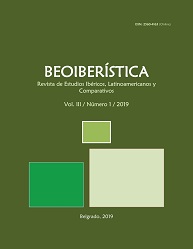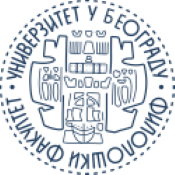Portuguese Folktales and the Politics of Subversion
DOI:
https://doi.org/10.18485/beoiber.2019.3.1.5Apstrakt
Folktales are not only a rich repository of the collective imaginary and of the social myths of a community, but they also harbor the political and social tensions that have marked the history of nations. Such tensions usually veiled under the guise of symbols and other forms of literary representation end up weaved into narratives that voice the common man’s yearning for justice and empowerment. This paper attempts to draw a parallel between some of the Portuguese folktales and one of the most important 15th-century historiographic accounts, Crónica de D. Joāo I – written by royal chronicler Fernão Lopes, dubbed Portugal’s first historian – where, in his quest for the truth, the “people” acquire narrative density and challenge the powers that be. The conceptual framework for this comparative study draws on Fredric Jameson’s notion of political unconscious, according to which texts are to be regarded as political fantasies, resulting mainly from repression and contradicted impulses. Two examples of folktales where these tensions are resolved to the benefit of the common man are provided.Key words: folktales, historical chronicles, Portuguese medieval history, political unconscious, social empowerment.Reference
Barnes, W. J. Portugal Gateway to Greatness. Vancouver: Read Books, 2006. Print.
Brenner, Robert. «The Rises and Declines of Serfdom in Medieval and Early Modern Europe». Michael L. Bush (ed.), Serfdom and Slavery: Studies in Legal Bondage, London: Longman, 1996: 247–76. Print.
Comninel, Gorge. Feudalism and the Origins of Capitalism. Toronto: York University, Department of Political Science, 1992. Unpublished manuscript.
Ferreira, Maria Ema Tarracha (ed.) Crónicas de Fernão Lopes [The Chronicles of Fernão Lopes]. Lisbon: Ulisseia, 1988. Impresso.
Gomes Ferreira, José. Contos Tradicionais Portugueses, Lisbon: Iniciativas Editoriais, 1977. Impresso.
Herculano, Alexandre. Opúsculos, Tomo 5. Lisbon: Bertrand, 1886. Impresso.
Hilton, Rodney. Bond Men Made Free: Medieval Peasant Movements and the English Rising of 1381. London: Routledge, 1988. Print.
Jack, Malcolm. Lisbon, city of the sea: a history. London: Tauris, 2007. Print.
Jameson, Fredric. The Political Unconscious: Narrative as a Socially Symbolic Act. New York: Cornell University Press, 1981. Print.
Teschke, Benno. «Geopolitical Relations in the European Middle Ages: History and Theory». International Organization, 52.2 (Spring 1998): 325–358. Print.
Brenner, Robert. «The Rises and Declines of Serfdom in Medieval and Early Modern Europe». Michael L. Bush (ed.), Serfdom and Slavery: Studies in Legal Bondage, London: Longman, 1996: 247–76. Print.
Comninel, Gorge. Feudalism and the Origins of Capitalism. Toronto: York University, Department of Political Science, 1992. Unpublished manuscript.
Ferreira, Maria Ema Tarracha (ed.) Crónicas de Fernão Lopes [The Chronicles of Fernão Lopes]. Lisbon: Ulisseia, 1988. Impresso.
Gomes Ferreira, José. Contos Tradicionais Portugueses, Lisbon: Iniciativas Editoriais, 1977. Impresso.
Herculano, Alexandre. Opúsculos, Tomo 5. Lisbon: Bertrand, 1886. Impresso.
Hilton, Rodney. Bond Men Made Free: Medieval Peasant Movements and the English Rising of 1381. London: Routledge, 1988. Print.
Jack, Malcolm. Lisbon, city of the sea: a history. London: Tauris, 2007. Print.
Jameson, Fredric. The Political Unconscious: Narrative as a Socially Symbolic Act. New York: Cornell University Press, 1981. Print.
Teschke, Benno. «Geopolitical Relations in the European Middle Ages: History and Theory». International Organization, 52.2 (Spring 1998): 325–358. Print.
##submission.downloads##
Objavljeno
2019-05-26
Kako citirati
Bernardo Lopes, A. M. „Portuguese Folktales and the Politics of Subversion“. BEOIBERISTIKA - Časopis Za Iberijske, latinoameričke I Komparativne Studije (ISSN: 2560-4163 Online), том 3, изд. 1, Мај 2019., стр. 71-79, doi:10.18485/beoiber.2019.3.1.5.
Broj časopisa
Sekcija
KULTURE U DIJALOGU
Licenca
Autori koji objavljuju u ovom časopisu pristaju na sledeće uslove:
- Autori zadržavaju autorska prava i pružaju časopisu pravo prvog objavljivanja rada i licenciraju ga pod okriljem Creative Commons Attribution-ShareAlike 4.0 International License koja omogućuje drugima da dele rad uz uslov navođenja autorstva i izvornog objavljivanja u ovom časopisu.
- Autori mogu da izrade zasebne, ugovorne aranžmane za ne-ekskluzivnu distribuciju rada objavljenog u časopisu (npr. postavljanje u institucionalni repozitorij ili objavljivanje u knjizi), uz navođenje da je rad izvorno objavljen u ovom časopisu.
- Autorima je dozvoljeno i podstiču se da postave objavljeni rad on-line (npr. u institucionalnom repozitoriju ili na svojim mrežnim stranicama) pre i tokom postupka prijave, s obzirom na to da takav postupak može voditi produktivnoj razmeni ideja, te ranijoj i većoj citiranosti objavljenog rada (up. The Effect of Open Access).













